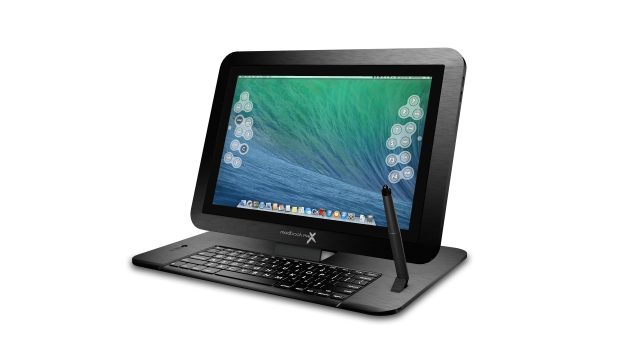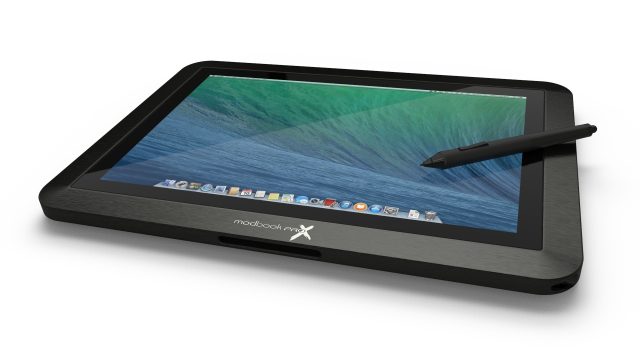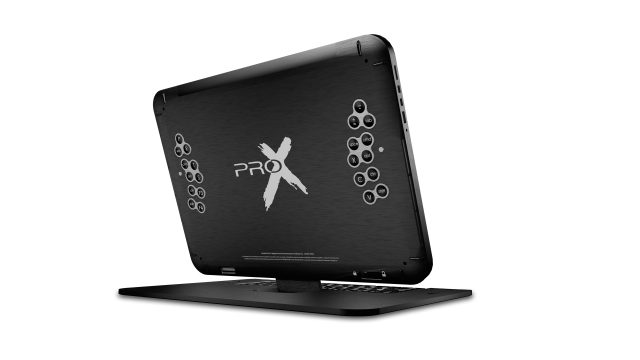
Before the iPad, people who wanted an Apple tablet could buy something called the "Modbook" from a company named Axiotron. For $2,279, the company would take a regular white plastic MacBook, take it apart, and reassemble it inside a purpose-built tablet case with a Wacom digitizer and stylus installed. After some financial trouble and the launch of an actual Apple tablet, Axiotron became Modbook Inc., and the company launched the Modbook Pro, which did for the 13-inch MacBook Pro what the Modbook did for the standard Macbook.
Today the company is ready to announce the third iteration of the Modbook, kind of. The Modbook Pro X takes the 15-inch Retina MacBook Pro (including the refreshed models introduced yesterday), makes some modifications to its specs, and puts it into a tablet case. Like past Modbooks, the Modbook Pro X is designed to appeal to artists and other creative professionals who would like to draw directly on their tablet screens without having to use a separate drawing tablet. The catch? This project currently exists only as a Kickstarter project, with no guarantee the product will see the light of day if it doesn't hit its $150,000 funding goal.

The Modbook Pro X will preserve all of the original ports and the CPU, GPU, and screen specs of the 2013 Retina MacBook Pro, crammed into a black tablet that's 0.7 inches thick and weighs 4.95 pounds, around half a pound heavier than the Retina MacBook Pro is by itself. The screen will be covered by a digitizer that supports 2,048 different pressure levels, and the Modbook will come with software installed to take advantage of the digitizer hardware. Optional "keybars," small rows of keys mounted to the back of the tablet, will provide keyboard hotkey shortcuts that users can press without interrupting whatever they're sketching onscreen.

The Modbook line gets around Apple's legal team because it's not trying to sell Mac clone hardware, as companies like the long-defunct Psystar have attempted in the past. Modbook Inc. takes actual Apple hardware and modifies it, so you're still technically using a Mac that can freely install all Mac software, updates, and operating system upgrades without fear of breaking the system. Modbook is making some significant upgrades to the Retina MacBook Pro's internals, though, including optional upgrades to a 2TB solid-state drive and 32GB of RAM (Apple's official limit is 16GB, and that memory is soldered to the motherboard). Modbook Inc. would tell us only that it was using "a state-of-the-art facility" to upgrade the laptop's RAM—we'd guess that the old RAM is being desoldered and replaced with higher-capacity chips.
New Modbooks come out rarely enough that each new iteration has to compete in a much different marketplace than its predecessor. The iPad was released in the interval between the Modbook and the Modbook Pro. Since the Modbook Pro launched, the market has been flooded with Windows 8 convertibles, many of which include active digitizers and pens. Microsoft's Surface Pro 3 starts at $799, far south of any Modbook past or present, and the Surface lineup generally has a solid reputation among artists. Modbook Inc. CEO Andreas Haas doesn't seem bothered by the more crowded niche.
"Of course, we're always concerned about the market we're selling into. But the fact is many of these tablet devices are underpowered and don't really have the specs or pen functionality that creative users are interested in, not to mention the fact that none of them are Macs," Haas told Ars. "High-end gaming systems such as those made by Alienware find a market among interested users, and the same is true of our high-performance products, including (we think) the Modbook Pro X."
Assuming the Modbook Pro X is funded, you'll be able to get one by either buying it outright or by sending your own Retina MacBook Pro in to be converted. Kickstarter backers who pledge at the $1,999 level will be able to send their computers in to be converted by "early 2015." This is, of course, a cost added to the $1,999-or-more you've already spent on the computer—Modbooks have always been expensive, and the Modbook Pro X will be no different. A complete Modbook Pro X starts at $3,999 for Kickstarter backers and goes up quickly from there as you add accessories and bump up the specs, and the Kickstarter page estimates the actual retail price will be about $4,599. For now, supporting the Kickstarter is the only way to preorder one, and if the project isn't funded, the Modbook Pro X may never see the light of day at all.
"We've been asked to build a product like the Modbook Pro X for several years," Haas told Ars. "Launching it on Kickstarter allows us to work directly with interested customers to get the product built, thus gauging support for its market acceptance. If it fails to gain support on Kickstarter, one potential outcome is that we will not build it. However, we're excited about its potential, and we think it will be successful."
reader comments
65